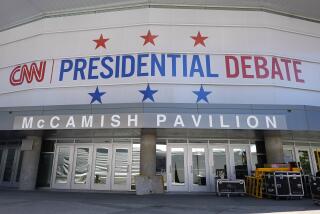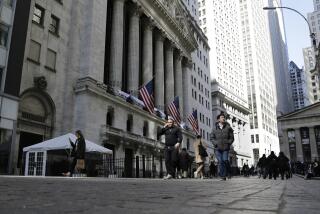Sarah Palin to criticize Federal Reserve’s plan to purchase Treasury bonds
- Share via
The ink isn’t even dry yet on the midterm election results when one of the key issues, how to stimulate the economy, returned on Monday to the political arena.
In remarks prepared for delivery at a trade association convention in Phoenix, Sarah Palin warns against the recently announced Federal Reserve policy to buy $600 billion in Treasury bonds. Excerpts of her speech were leaked to National Review Online.
“The Fed hopes doing this may buy us a little temporary economic growth by supplying banks with extra cash which they could then lend out to businesses,” Palin will argue. “But it’s far from certain this will even work. After all, the problem isn’t that banks don’t have enough cash on hand – it’s that they don’t want to lend it out, because they don’t trust the current economic climate.”
Palin is one of the leading Republican presidential aspirants in 2012 and the speech is designed to bolster her standing in two ways. Palin will be speaking about economic policy, trying to offset criticism from leading GOP strategists that she lacks the gravitas to be president. Polls also show that many, even in her own party, do not see her as sufficiently grounded in policy, to run for the top spot in 2012.
Secondly, Palin’s comments continue the narrative that unites Republicans and the “tea party” movement, where Palin serves as one of the most visible and liked leaders. The Obama administration has failed to provide a consistent economic climate that businesses can trust so they have not made the decisions needed to create more jobs, both groups argue.
Ultimately both groups are also united in pushing for cutting government spending, shrinking the deficit and debt and for additional permanent tax cuts, which they contend are the routes to economic improvement.
“All this pump priming will come at a serious price. And I mean that literally: everyone who ever goes out shopping for groceries knows that prices have risen significantly over the past year or so. Pump priming would push them even higher,” Palin argues.
“The weak dollar – a direct result of the Fed’s decision to dump more dollars onto the market – is pushing oil prices upwards. That’s like an extra tax on earnings,” she says, adding a pitch for the energy policy that has helped propel her into the national spotlight. “And the worst part of it: because the Obama White House refuses to open up our offshore and onshore oil reserves for exploration, most of that money will go directly to foreign regimes who don’t have America’s best interests at heart.”
In India, President Obama was careful to note that the Federal Reserve was separate from the White House and “it’s important as a policy matter, as an institutional matter, that we don’t comment on particular Fed actions.”
But speaking at a joint news conference with Indian Prime Minister Manmohan Singh, Obama backed the Fed acting to stimulate trade, one of the offshoots of its policy to buy bonds.
“I will say that the Fed’s mandate, my mandate, is to grow our economy,” Obama said. “And that’s not just good for the United States, that’s good for the world as a whole.
“The United States has been an engine for growth, for trade, for opportunity for decades now. And we’ve just gone through an extraordinary economic trauma, which has resulted in some extraordinary measures. And the worst thing that could happen to the world economy, not ours -- not just ours, but the entire world’s economy -- is if we end up being stuck with no growth or very limited growth. And I think that’s the Fed’s concern, and that’s my concern as well.”
Unlike many other foreign leaders, Singh backed Obama. Major trading countries in Europe and Asia have argued that the Fed action could trigger a currency war by weakening the dollar.
“I don’t claim to have any expert knowledge of the working of the American economy. But I do know one thing: that a strong, robust, fast-growing United States is in the interests of the world,” Singh said. “And therefore, anything that would stimulate the underlying growth and policies of entrepreneurship in the United States would help the cause of global prosperity.”
Michael.muskal@latimes.com
Twitter.com/LATimesmuskal
More to Read
Get the L.A. Times Politics newsletter
Deeply reported insights into legislation, politics and policy from Sacramento, Washington and beyond. In your inbox twice per week.
You may occasionally receive promotional content from the Los Angeles Times.










